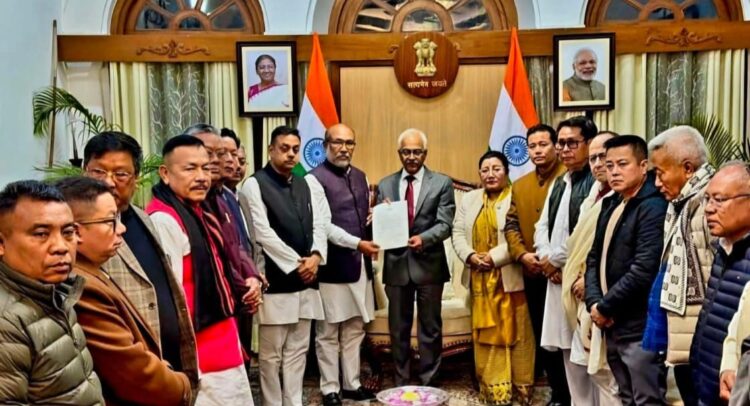Asem Bhakta, Special Correspondent North East
Imphal: (Waari Singbul Network) The political tide in Manipur has turned dramatically. Once unthinkable, the resignation of Chief Minister N. Biren Singh has now reshaped the state’s already fragile landscape. But was it a voluntary step down, or was he pushed into a corner by forces both within and outside his party?
For months, Manipur has been in crisis, a state struggling to maintain order as ethnic tensions boiled over. And now, with the BJP unable to replace him, the President’s Rule has been imposed—an outcome that raises more questions than answers. Singh’s exit isn’t just about a change in leadership; it’s a signal of deeper political games at play, power struggles within the BJP, and an alarming shift in the Centre’s handling of the Northeast’s most volatile state.
True to his stand, Biren Singh made sure his departure came with a condition: Manipur’s territorial integrity must remain intact. No division of the state. No separate administration for the Kuki-Zo communities. This demand laid bare the core of Manipur’s crisis—the bitter divide between the Meiteis and the Kuki-Zo, further complicated by Delhi’s balancing act between communities.
The BJP, struggling to find a successor, had little choice but to take Singh’s terms while simultaneously preparing for President’s Rule. For many, this move was a calculated attempt to appease Kuki-Zo demands while trying to keep Meitei sentiments from erupting into further unrest.
Singh, however, had already lost real power long before his resignation. The real control had quietly shifted to Delhi. Security decisions were being made by the Union Home Ministry, with Manipur’s “United Command” reporting directly to the Centre. Singh was sidelined. He had no real say in how the crisis unfolded.
Yet, when things worsened, he was the one held responsible. A convenient fall guy. The BJP, caught between ethnic conflicts and electoral calculations, made a choice: it was easier to sacrifice Singh than to risk deeper political fallout.
To many in Manipur, Singh’s removal feels less like a necessary political decision and more like a punishment for doing what he believed was right. His administration took some hard, decisive steps, which included the crackdown on poppy cultivation/drug cartels, the clearing of encroachments in reserved forests, and a push for the National Register of Citizens (NRC) to curb illegal immigration from Myanmar. These decisions alienated the Kuki-Zo, a key voter base for the BJP, while solidifying his support among the Meitei and Nagas. His removal, many believe, was a way to regain favor with this group.
With Singh out and no BJP leader ready to step up, the Centre had no option but to impose President’s Rule. Kuki-Zo leaders welcomed it, seeing it as a step toward their demands for a separate administration. Meiteis, on the other hand, viewed it as a betrayal—a sign that the Centre was leaning towards conceding Kuki-Zo aspirations at their expense.
For the Meitei community, the worst part isn’t just losing Singh. It’s the failure of their own elected representatives to rally behind a new leader. Instead of uniting, Manipur’s political class has been consumed by infighting, leaving the state rudderless at a time when strong leadership is most needed.

Biren Singh’s resignation isn’t the end of Manipur’s troubles. If anything, it marks a new chapter in an already volatile crisis. The state remains deeply fractured, with trust in governance at an all-time low. Biren Singh’s fall wasn’t just about one man stepping down. It was about a power play in a state caught between ethnic conflict, external interference, and political expediency. His resignation might have been controversial, but the real question remains: who stands to gain from his removal, and what will Manipur pay for this change in leadership?


